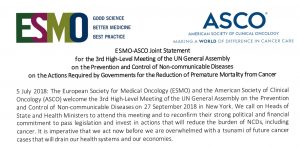 The European Society for Medical Oncology (ESMO) and the American Society of Clinical Oncology (ASCO) are worried by the “tsunami of future cancer cases that will drain our health systems and our economies”, and call on heads of state and health ministers to attend the meeting of the General Assembly of the United Nations on the Prevention and Control of Non-communicable Diseases, at the end of september 2018 in New York City. In a joint statement, governments are invited to “reconfirm their strong political and financial commitment to pass legislation and invest in actions that will reduce the burden of NCDs, including cancer. It is imperative that we act now before we are overwhelmed with a tsunami of future cancer cases that will drain our health systems and our economies”.
The European Society for Medical Oncology (ESMO) and the American Society of Clinical Oncology (ASCO) are worried by the “tsunami of future cancer cases that will drain our health systems and our economies”, and call on heads of state and health ministers to attend the meeting of the General Assembly of the United Nations on the Prevention and Control of Non-communicable Diseases, at the end of september 2018 in New York City. In a joint statement, governments are invited to “reconfirm their strong political and financial commitment to pass legislation and invest in actions that will reduce the burden of NCDs, including cancer. It is imperative that we act now before we are overwhelmed with a tsunami of future cancer cases that will drain our health systems and our economies”.
“We all share the goal of reducing premature mortality from cancer by 25% by 2025, as called for in the WHO Global Action Plan on NCDs, and by 33% by 2030, as called for by the 2030 United Nations Sustainable Development Goals” write the presidents of ESMO and ASCO Josep Tabernero and Monica M. Bertagnolli, along with Alexandru Eniu (ESMO Global Policy Chair) and Abdulrahman Jazieh (ASCO International Affairs Committee Chair), in a statement issued on the occasion of the United Nations Civil Society Hearing on non-communicable diseases (NCDs) in New York. “To achieve these goals, we request that the UN Political Declaration from the UN High-Level Meeting on NCDs state that it is necessary for governments to:
- Implement the 2017 World Health Assembly Cancer Resolution which should serve as the reference document to improve cancer control.
- Develop and strengthen educational programs that provide cost-effective lifestyle recommendations to prevent tobacco use, reduce harmful use of alcohol, promote physical activity, and encourage healthy weight control.
- Develop efficient and cost-effective primary prevention measures (e.g. HPV vaccination, viral hepatitis infection vaccination, and Helicobacter pylori eradication).
- Assure timely access to screening for pre-malignant lesions, early-stage diagnosis, and high-quality, affordable cancer treatment for all stages of cancer including advanced/metastatic cancers.
- Strengthen health systems to achieve access for all and provide necessary cancer services to the millions of patients who die prematurely because they do not have access to cancer treatment.
- Provide essential secondary health care services that assure an adequate number of well-trained
- oncology professionals, who have sustainable access to the resources required to provide
- appropriate treatment, and supportive and palliative care.
- Commit to achieving the targets of reducing premature mortality by 25% by 2025, and by 33% by
- 2030, across all NCDs.
- We request that the above actions be linked to time-bound deliverables that turn commitments into action, and for which governments are held accountable. ESMO and ASCO stand ready to do their part and support the WHO, the United Nations, and Member States, with our expertise in cancer management, our post-graduate training and educational courses, and our outreach to the oncology professionals worldwide who treat and care for cancer patients every day.
“Recent UN and WHO reports note that unless countries significantly scale-up their actions and investments, they will not meet agreed targets to reduce deaths from non-communicable diseases” added Tabernero. “We are concerned that governments may find it easier to achieve their targets by reducing deaths from only some NCDs, leaving cancer patients behind. We believe there are cost-effective ways to improve cancer care and stand ready to assist countries in doing this by providing our expertise in cancer management to support implementation of the 2017 World Health Assembly Cancer Resolution.”





